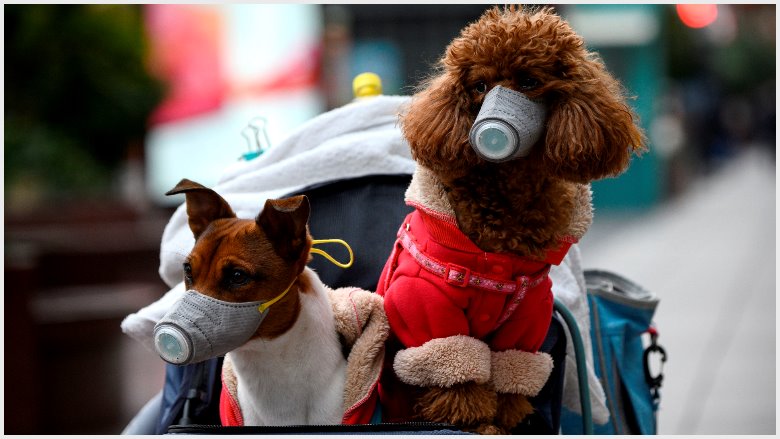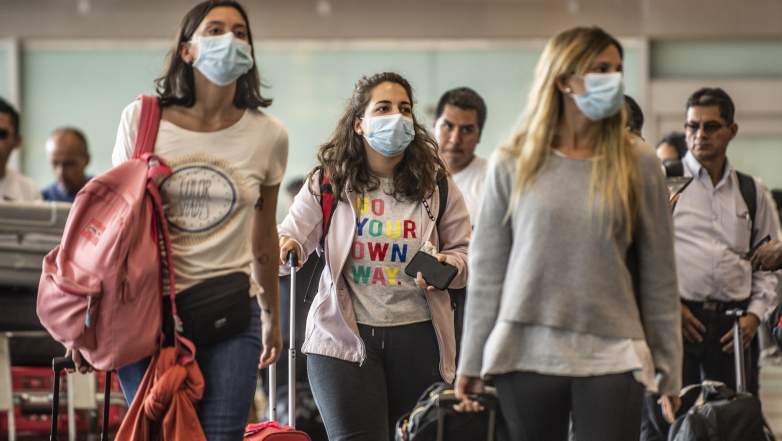
Getty Can dogs, cats, and other pets or animals get coronavirus?
With concerns over coronavirus growing throughout the United States and world, people have a lot of questions about how the virus works. Among them: Can dogs get coronavirus? Can cats and other pets or animals get coronavirus?
To be sure, there are still a lot of unknowns about coronavirus. That’s partly simply there isn’t a lot of data to study yet; the virus is relatively new. It’s also because it originated in notoriously secretive China, which could be downplaying the seriousness.
As of March 3, 2020, the Center for Disease Control and Protection was reporting, “CDC is responding to an outbreak of respiratory disease caused by a novel (new) coronavirus that was first detected in China and which has now been detected in almost 70 locations internationally, including in the United States…Community spread means some people have been infected and it is not known how or where they became exposed.”
Here’s what you need to know about whether dogs, cats, and other pets can get coronavirus.
Dogs, Cats & Other Pets Can Test Positive for Coronavirus at Low Levels

GettyPassengers walk while wearing protective masks, as a preventive measure regarding the COVID-19 virus, at Jorge Chavez International Airport, in Lima on February 27, 2020.
Yes, it’s possible for animals to test positive for coronavirus. According to The Miami Herald, they can test positive “for low levels of coronavirus,” and that’s according to the Hong Kong Agriculture, Fisheries and Conservation Department.
That department reported in a press release: “A spokesman for the Agriculture, Fisheries and Conservation Department (AFCD) said today (March 4) that a pet dog had repeatedly tested weak positive for COVID-19 virus which indicates a low-level of infection with the virus.” The press release continues:
The AFCD first collected samples from the dog for tests on February 26, and detected low levels of COVID-19 virus from its nasal and oral cavity samples on February 27. The Department repeated the test on February 28 and March 2, and the dog’s nasal and oral cavity samples, and nasal samples, respectively, tested weak positive for the virus. Experts from the School of Public Health of The University of Hong Kong, the College of Veterinary Medicine and Life Sciences of the City University of Hong Kong and the World Organisation for Animal Health (OIE) have been consulted, and unanimously agreed that these results suggest that the dog has a low-level of infection and it is likely to be a case of human-to-animal transmission. The dog has not shown any signs of disease related to COVID-19. It is currently under quarantine at the animal keeping facility at the Hong Kong Port of Hong Kong-Zhuhai-Macao Bridge.
There are two dogs under quarantine at the animal keeping facility at the Hong Kong Port of Hong Kong-Zhuhai-Macao Bridge at the moment, which are staying in individual rooms. The other dog tested negative for COVID-19 virus. The Department has stepped up cleansing and disinfection of the facility…
The spokesman emphasized that there is currently no evidence that pet animals can be a source of infection of COVID-19 or that they become sick. Apart from maintaining good hygiene practices, pet owners need not be overly concerned and under no circumstances should they abandon their pets.
However, despite that report, the Centers for Disease Control and Prevention (CDC), says that it’s not likely you will get coronavirus from a pet. “While this virus seems to have emerged from an animal source, it is now spreading from person-to-person in China,” CDC wrote. “There is no reason to think that any animals including pets in the United States might be a source of infection with this new coronavirus. To date, CDC has not received any reports of pets or other animals becoming sick with COVID-19. At this time, there is no evidence that companion animals including pets can spread COVID-19. However, since animals can spread other diseases to people, it’s always a good idea to wash your hands after being around animals.”
However, the CDC advises that people with coronavirus avoid contact with pets, just in case, writing, “You should restrict contact with pets and other animals while you are sick with COVID-19, just like you would around other people. Although there have not been reports of pets or other animals becoming sick with COVID-19, it is still recommended that people sick with COVID-19 limit contact with animals until more information is known about the virus. When possible, have another member of your household care for your animals while you are sick. If you are sick with COVID-19, avoid contact with your pet, including petting, snuggling, being kissed or licked, and sharing food. If you must care for your pet or be around animals while you are sick, wash your hands before and after you interact with pets and wear a facemask.”
According to MSN.com, coronavirus spreads through “direct contact with respiratory droplets.” So when someone sneezes or coughs, other people can get it by touching objects that those droplets have landed on. MSN.com reports that experts aren’t sure yet whether coronavirus can be caught twice, and that concerns about that largely emanated from the Japanese case; it’s possible that the virus could remain in the lungs but people tested through the nose or throat could test negative for it.
CDC reports that coronavirus “is thought to spread mainly from person-to-person. Between people who are in close contact with one another (within about 6 feet). Through respiratory droplets produced when an infected person coughs or sneezes. These droplets can land in the mouths or noses of people who are nearby or possibly be inhaled into the lungs.”
READ NEXT: Coronavirus Myths.